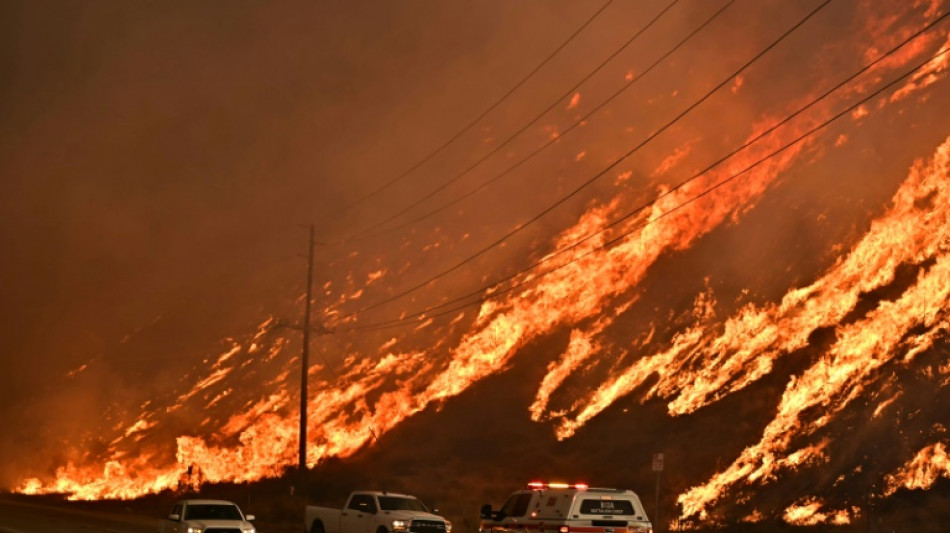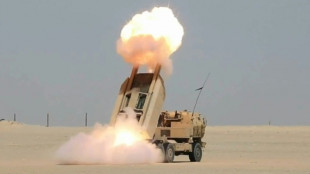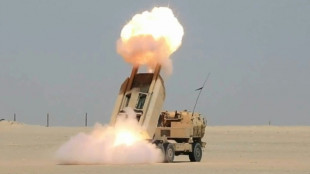
-
 Iran players sing anthem and salute at Women's Asian Cup
Iran players sing anthem and salute at Women's Asian Cup
-
India beat England in high-scoring T20 World Cup semi-final

-
 Mideast war traps 20,000 seafarers, 15,000 cruise passengers in Gulf
Mideast war traps 20,000 seafarers, 15,000 cruise passengers in Gulf
-
Italy bring back Brex to face England

-
 French policeman to be tried over 2023 killing of teen
French policeman to be tried over 2023 killing of teen
-
More flights take off despite continued fighting in Middle East

-
 Ukraine, Russia free 200 POWs each
Ukraine, Russia free 200 POWs each
-
Middle East war halts work at WHO's Dubai emergency hub

-
 Paramount's Ellison vows CNN editorial independence
Paramount's Ellison vows CNN editorial independence
-
US says attacks on alleged drug boats have spooked traffickers

-
 Dempsey returns as Scotland shuffle pack for Six Nations clash against France
Dempsey returns as Scotland shuffle pack for Six Nations clash against France
-
India pile up 253-7 against England in T20 World Cup semi-final

-
 Wary Europeans pledge 'defensive' military aid in Mideast war
Wary Europeans pledge 'defensive' military aid in Mideast war
-
Oil prices rise, stocks drop as Middle East war stirs supply concerns

-
 Seven countries to boycott Paralympics ceremony over Russia: organisers
Seven countries to boycott Paralympics ceremony over Russia: organisers
-
UK's Crufts dog show opens with growing global appeal

-
 PSG prepare for Chelsea clash with Monaco rematch
PSG prepare for Chelsea clash with Monaco rematch
-
Google opens AI centre as Berlin defends US tech reliance

-
 Second Iranian ship nears Sri Lanka after submarine attack
Second Iranian ship nears Sri Lanka after submarine attack
-
Portugal mourns acclaimed writer Antonio Lobo Antunes

-
 Union loses fight against Tesla at German factory
Union loses fight against Tesla at German factory
-
Wales revel in being the underdogs, says skipper Lake

-
 German school students rally against army recruitment drive
German school students rally against army recruitment drive
-
Wary European states pledge military aid for Cyprus, Gulf

-
 Liverpool injuries frustrating Slot in tough season
Liverpool injuries frustrating Slot in tough season
-
Real Madrid will 'keep fighting' in title race, vows Arbeloa

-
 Australia join South Korea in quarters of Women's Asian Cup
Australia join South Korea in quarters of Women's Asian Cup
-
Stocks, oil climb as Middle East war stirs volatility

-
 Kane to miss Bayern game against Gladbach with calf knock
Kane to miss Bayern game against Gladbach with calf knock
-
Henman says Raducanu needs more physicality to rise up rankings

-
 France recall fit-again Jalibert to face Scotland
France recall fit-again Jalibert to face Scotland
-
Harry Styles fans head in one direction: to star's home village

-
 Syrian jailed over stabbing at Berlin Holocaust memorial
Syrian jailed over stabbing at Berlin Holocaust memorial
-
Second Iranian ship heading to Sri Lanka after submarine attack

-
 Middle East war spirals as Iran hits Kurds in Iraq
Middle East war spirals as Iran hits Kurds in Iraq
-
Norris hungrier than ever to defend Formula One world title

-
 Fatherhood, sleep, T20 World Cup final: Henry's whirlwind journey
Fatherhood, sleep, T20 World Cup final: Henry's whirlwind journey
-
Conservative Nigerian city sees women drive rickshaw taxis

-
 T20 World Cup hero Allen says New Zealand confidence high for final
T20 World Cup hero Allen says New Zealand confidence high for final
-
The silent struggle of an anti-war woman in Russia

-
 Iran hits Kurdish groups in Iraq as conflict widens
Iran hits Kurdish groups in Iraq as conflict widens
-
China sets lowest growth target in decades as consumption lags

-
 Afghans rally against Pakistan and civilian casualties
Afghans rally against Pakistan and civilian casualties
-
South Korea beat Philippines 3-0 to reach women's quarter-finals

-
 Mercedes' Russell not fazed by being tipped as pre-season favourite
Mercedes' Russell not fazed by being tipped as pre-season favourite
-
Australia beat Taiwan in World Baseball Classic opener

-
 Underdogs Wales could hurt Irish after Scotland display: Popham
Underdogs Wales could hurt Irish after Scotland display: Popham
-
Gilgeous-Alexander rules over Knicks again in Thunder win

-
 Hamilton reveals sequel in the works to blockbuster 'F1: The Movie'
Hamilton reveals sequel in the works to blockbuster 'F1: The Movie'
-
Alonso, Stroll fear 'permanent nerve damage' from vibrating Aston Martin


The pioneering science linking climate to weather disasters
Extreme weather is becoming more destructive as the world warms, but how can we say that climate change intensified the fires in Los Angeles, typhoons in the Philippines, or flooding in Spain?
That question was once difficult question to answer. But thanks to the pioneering field of attribution science, experts can quickly examine the possible influence of global warming on a specific weather event.
The fast-growing field began two decades ago and is now firmly established, but it is still sometimes hampered by a lack of data.
- Real-world impact -
After disaster strikes, an attribution study can quickly help tell governments, industry and ordinary people if climate change played a role.
"It's important for citizens, for decision-makers, and it's also very important for scientists, because with each case study, we learn new things about our models, our observations and the problems we encounter with them," said Robert Vautard, a leading scientist with the UN's climate expert panel, who has supported the development of attribution studies.
In the future, these studies could also play a growing role in legal disputes.
Already a 2021 scientific study was used by a Peruvian farmer in his battle against German electricity giant RWE, which he accused of playing a role in the melting of a glacier.
That research found the glacier's retreat was "entirely attributable" to global warming.
- Different approaches -
The main questions attribution studies seek to answer are: did the warmer climate make a flood, heatwave, fire or storm more likely, and did it increase its ferocity?
Several groups have developed methods that have been independently validated by other researchers.
The most active and influential group of researchers is World Weather Attribution (WWA), whose work is often reported in the media.
Using computer models, scientists can compare a simulation of a particular weather event against a world in which warming caused by the burning of fossil fuels and other human activities was not present.
In their most recent study, WWA researchers found that climate change increased the risk of the Los Angeles wildfires, which have killed at least 29 people and destroyed more than 10,000 homes since igniting on January 7.
Tinderbox conditions fuelling the blazes were approximately 35 percent more likely due to global warming caused by burning fossil fuels, they found, reducing rainfall, drying out vegetation and extending the overlap between flammable drought conditions and powerful Santa Ana winds.
Other organisations running attribution studies include Britain's Met Office, which also compares today's climate with simulations of a world with a climate more like the one before the Industrial Revolution.
Yet others use more broad-brush techniques, including ClimaMeter, which describes itself as "an experimental rapid framework for understanding extreme weather events".
The group uses historical observational data, rather than more complex computer models, as well as news reports and AI tools like ChatGPT, although it admits that its method is less effective at analysing very unusual events.
- No single cause -
Scientists stress that climate change should not be considered the sole cause of an extreme event and its impacts.
"For instance, if a heavy smoker develops lung cancer, we would not say the cigarettes caused the cancer -- but we might say the damage caused by the cigarettes made it more likely," WWA explains on its website.
Researchers also look at political or social factors that make a weather disaster more deadly or destructive -- poor quality construction, for example, or badly maintained infrastructure.
Some types of extremes have a well-established link with climate change, such as heatwaves or heavy rainfall.
"More and more, we're starting to have events that we can clearly say would have had a near-zero probability without our influence on the climate," said Sonia Seneviratne, a climate scientist who has worked with WWA.
"Events are now becoming so extreme that it's easier to detect this influence," she notes.
Other phenomena like droughts, snowstorms, tropical storms and forest fires can result from a combination of factors and are more complex.
- Search for data -
Another limitation that worries researchers is the scarcity of observational data and measurements in certain parts of the world, particularly in Africa.
That dearth makes it harder to study impacts, leading to inconsistency between different analyses.
"The lack of observed data is penalising in certain regions. There is also a lack of model data, i.e. high-resolution climate simulations," said Aurelien Ribes, a climate scientist at the French meteorological research agency CNRM.
He stressed the need for consistency and said that "any future use of this data in legal or compensation proceedings will have to be based on more systematic approaches".
O.M.Souza--AMWN


